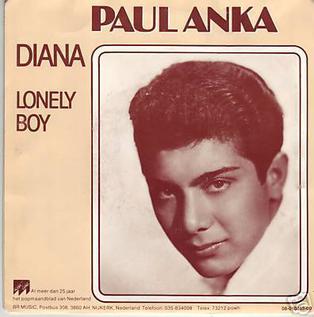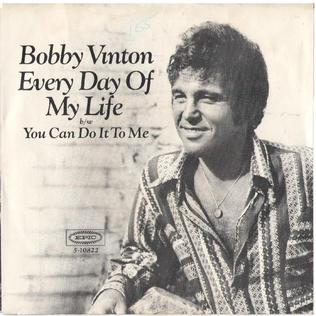Related Research Articles

"He" is a song about God, written in 1954. The song made the popular music charts the following year.

"Mr. Sandman" is a popular song written by Pat Ballard and published in 1954. It was first recorded in May of that year by Vaughn Monroe & his orchestra and later that year by The Chordettes and the Four Aces. The song's lyrics convey a request to "Mr. Sandman" to "bring me a dream" – the traditional association of the folkloric figure. The pronoun used to refer to the desired dream is often changed depending on the sex of the singer or group performing the song, as the original sheet music publication, which includes male and female versions of the lyrics, intended.
"Goodnite, Sweetheart, Goodnite" is a popular song that was a hit during the mid-1950s. It was written by Calvin Carter and James "Pookie" Hudson in 1951, and was first recorded by The Spaniels in 1953. It has also been released by some artists as "Goodnight, Well It's Time to Go".
"Let Me Go, Lover!", a popular song, was written by Jenny Lou Carson and Al Hill, a pen name used by Fred Wise, Kathleen Twomey, and Ben Weisman. It is based on an earlier song called "Let Me Go, Devil", about alcoholism.
"Memories Are Made of This" is a popular song about nostalgia, written in 1955 by Terry Gilkyson, Richard Dehr, and Frank Miller. They were the members of a three-pieced group called "The Easy Riders", who served as a backing band for Dean Martin's version of this song, also released in 1955.

"Diana" is a song written and first performed by Paul Anka, who recorded it in May 1957 at Don Costa’s studio in New York City. Anka stated in his autobiography that the song was inspired by a girl named Diana Ayoub, whom he had met at his church and community events, and had developed a crush on. Session musicians on the record included George Barnes playing lead guitar, Bucky Pizzarelli playing the "Calypso" riff on guitar, Irving Wexler on piano, Jerry Bruno on bass, and Panama Francis on drums. The song was recorded in May 1957 at RCA Victor Studios in New York. Backup singers included Artie Ripp.
"Blue Velvet" is a popular song written and composed in 1950 by Bernie Wayne and Lee Morris. A top 20 hit for Tony Bennett in its original 1951 version, the song has since been re-recorded many times, with a 1963 version by Bobby Vinton reaching No. 1.
"Young Love" is a popular song, written by Ric Cartey and Carole Joyner, and published in 1956. The original version was recorded by Ric Cartey with the Jiva-Tones on November 24, 1956. Joyner was a high school student when she co-wrote the song with Cartey, her boyfriend at the time. It was released in 1956 by Stars Records as catalog number 539 and one month later by RCA Records as catalog number 47-6751. Cartey's version never charted.

"Eddie My Love" is a 1956 doo wop song. According to BMI and ASCAP, the song was written by Maxwell Davis (BMI), Aaron Collins, Jr. (ASCAP), and Sam Ling (BMI). Maxwell Davis played sax on the Teen Queens record. Aaron Collins was the brother of the Teen Queens. Sam Ling was an alias of Saul Bihari, co-founder of Modern, RPM, and other labels; Bihari and his brothers regularly attached their names to songwriting credits as a means of getting a cut of the royalties, as was common practice at the time.
"There! I've Said It Again" is a popular song written and published by Redd Evans and David Mann in 1941. In early 1945, Vaughn Monroe and his Orchestra released Victor 20-1637, which reached the number one position on the Billboard's National Radio Airplay chart for five straight weeks, then no.2 for six more weeks, and a total run of 29 weeks. It finished 1945 as the no. 4 record of the year.

"Ev'ry Day of My Life" is a popular song written in 1954 by Al Jacobs and Jimmie Crane.
"Cradle of Love" is a song released in 1960 by Johnny Preston written by Jack Fautheree & Wayne Gray.
"Feel So Fine" is a song released in 1960 by Johnny Preston. The song is a reworking of the 1955 song "Feel So Good" by Shirley & Lee, with modified lyrics.

"So Sad (To Watch Good Love Go Bad)" is a song written by Don Everly, which was released by The Everly Brothers in 1960. The song was later a country hit for multiple artists in the 1970s and 80s.
"Just as Much as Ever" is a song written by Charles Singleton and Larry Coleman. The song was a hit single for Bob Beckham, Nat King Cole, and Bobby Vinton.
"(Remember Me) I'm The One Who Loves You" is a song written and originally sung by Stuart Hamblen, which he released in 1950. The song was a hit for Ernest Tubb the same year, and Dean Martin in 1965. Johnny Cash also covered it on his 1957 debut album Johnny Cash with His Hot and Blue Guitar!
"Bless You" is a song released in 1961 by Tony Orlando. The song was written by Barry Mann and Cynthia Weil.
"The Man in the Raincoat" is a song written by Warwick Webster, which was first released by Priscilla Wright in April 1955, and became a hit in the United States. Another hit version was released by Marion Marlowe later that year.
Billboard Top Country & Western Records of 1955 is made up of three year-end charts compiled by Billboard magazine ranking the year's top country and western records based on record sales, disc jockey plays, and juke box plays.
References
- 1 2 Rice, Jo (1982). The Guinness Book of 500 Number One Hits (1st ed.). Enfield, Middlesex: Guinness Superlatives Ltd. pp. 23–4. ISBN 0-85112-250-7.
- ↑ "The Nation's Top 50", Cash Box , January 21, 1956. p. 28. Retrieved April 6, 2018.
- ↑ "The Nation's Top Ten Juke Box Tunes", Cash Box , January 28, 1956. p. 4. Retrieved April 6, 2018.
- ↑ "Honor Roll of Hits", Billboard , January 21, 1956. p. 28. Retrieved April 8, 2018.
- ↑ "1956's Top Tunes", Billboard , December 29, 1956. p. 32. Retrieved April 29, 2018.
- ↑ "DECCA (USA) 78rpm numerical listing discography: 29500 - 30000". 78discography.com. Retrieved 2014-04-03.
- ↑ "Most Played in Juke Boxes", Billboard , January 21, 1956. p. 32. Retrieved April 8, 2018.
- ↑ "The Top 100", Billboard , February 4, 1956. p. 40. Retrieved April 8, 2018.
- ↑ "Best Sellers in Stores", Billboard , January 28, 1956. p. 46. Retrieved April 8, 2018.
- 1 2 "Most Played by Jockeys", Billboard , December 10, 1955. p. 38. Retrieved April 8, 2018.
- ↑ Whitburn, Joel (1987) The Billboard Book of Top 40 Hits, Billboard Publications, Inc. p. 101.
- ↑ "The Ten Records Disk Jockeys Played Most This Week", Cash Box , December 17, 1955. p. 5. Retrieved April 29, 2018.
- ↑ DREAMWEAVERS - Full Official Chart History, Official Charts Company. Retrieved April 6, 2018.
- ↑ Roberts, David (2006). British Hit Singles & Albums (19th ed.). London: Guinness World Records Limited. pp. 56–7. ISBN 1-904994-10-5.
- ↑ "COLUMBIA Records (USA) 78rpm numerical listing discography: 40500 - 41000". 78discography.com. Retrieved 2014-04-03.
- ↑ "Most Played in Juke Boxes", Billboard , March 3, 1956. p. 36. Retrieved April 8, 2018.
- ↑ "The Top 100", Billboard , January 21, 1956. p. 40. Retrieved April 8, 2018.
- ↑ "Best Sellers in Stores", Billboard , December 17, 1955. p. 48. Retrieved April 8, 2018.
- ↑ Whitburn, Joel (1987) The Billboard Book of Top 40 Hits, Billboard Publications, Inc. p. 286.
- 1 2 "The Top 100", Billboard , December 17, 1955. p. 58. Retrieved April 8, 2018.
- ↑ "Most Played in Juke Boxes", Billboard , December 24, 1955. p. 22. Retrieved April 8, 2018.
- ↑ "Most Played by Jockeys", Billboard , December 3, 1955. p. 36. Retrieved April 8, 2018.
- ↑ Whitburn, Joel (1987) The Billboard Book of Top 40 Hits, Billboard Publications, Inc. p. 176.
- 1 2 Whitburn, Joel (1987) The Billboard Book of Top 40 Hits, Billboard Publications, Inc. p. 57.
- ↑ "Most Played by Jockeys", Billboard , December 24, 1955. p. 22. Retrieved April 8, 2018.
- ↑ https://www.45cat.com/record/msp6220 [ bare URL ]
- ↑ Mark Wynter - Full Official Chart History, Official Charts Company. Retrieved April 6, 2018.
- ↑ Hot 100 - Jimmy Velvet It's Almost Tomorrow Chart History, Billboard.com. Retrieved April 8, 2018.
- ↑ Adult Contemporary - Jimmy Velvet It's Almost Tomorrow Chart History, Billboard.com. Retrieved April 8, 2018.
- ↑ "Top 40 Easy Listening", Billboard , June 5, 1965. p. 4. Retrieved April 8, 2018.